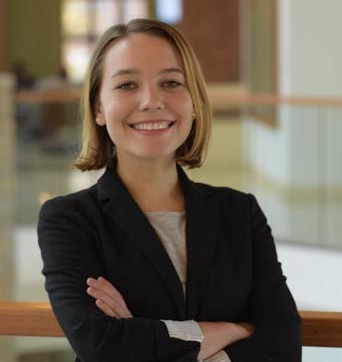Quinn Hirschi is a 5th year PhD candidate in the Department of Psychology at the University’s Graduate School of Arts and Sciences. Through her research she has discovered that people consistently report thinking they should speak less than 50% of the time in conversations with new people in order to be liked. In her dissertation research, she is investigating why people hold this mistaken belief. She hypothesized that the belief arises from people’s well-documented conversational insecurities and has thus far found support for this hypothesis.
Quinn was a Survey Research Intern in Summer 2021 and a Demographics Research Intern in Fall 2021 at the Weldon Cooper Center for Public Service. She previously participated in the Business in Society and Science Policy modules offered by PhD Plus.
Q. What are your post-PhD career aspirations?
It would be hard to plan out my entire career from where I am right now, but I am passionate about the basic research I have been conducting as a PhD student and would love to find opportunities to continue doing that work. However, through my two PhD+ internship projects, I have also learned that I enjoy applying the research skills I have been developing in my program to address real-world problems in my community and that I would also be happy in a more applied research role.
Q. Please summarize your PhD Plus internship.
I always wanted to do an internship during my PhD program, and through PhD+, I was lucky enough to do two! As a Survey Research Intern in Summer 2021, I cleaned, analyzed, and visualized survey data for several research projects, including one project investigating employee sense of belonging at the UVA Cancer Center, and another aimed at improving communication between the Blue Ridge Area Food Bank and their donors and community partners. As a Demographics Research Intern in Fall 2021, I compiled demographic data for various projects, including data on the number of people living in dorms, jails, and other group quarters across Virginia, and information on how various state Departments of Aging throughout the U.S. collect and share data on older adults with their respective Area Agencies on Aging. One of my favorite things about these experiences was the people. Despite the fact that the internships were largely virtual, I felt included, respected, mentored, and excited to meet many new people with shared interests.
Q. What professional skills did you develop during your internship?
I have been a dedicated R nerd for years and avoided learning how to use SPSS throughout my entire graduate career, but my summer internship supervisor taught me how to use it, and I am so thankful to her for that! It was easier to learn than I expected. I also think my internships helped me hone my communication skills and data cleaning, analysis, and visualization skills.
Q. How did the internship support your career development?
Through my two PhD+ internships, I’ve learned that I enjoy applying my research skills to address real-world problems in my community and that although I love conducting basic research, I would also be happy in a more applied research role.
Q. What advice would you give peers on utilizing PhD Plus internships for career development?
I know that doing an internship can feel like a major time commitment when you are simultaneously pursuing other research and professional goals. But if you are at all interested, I would strongly recommend it, especially through the PhD+ program. I liked that the PhD+ positions were part-time (as opposed to the other full-time positions I applied for) because they allowed me to continue making progress on my research simultaneously. I would also recommend actively participating in the monthly sessions that the PhD+ office leads to encourage interns to reflect on their professional strengths, experiences, and goals. You can get a lot out of those conversations.

